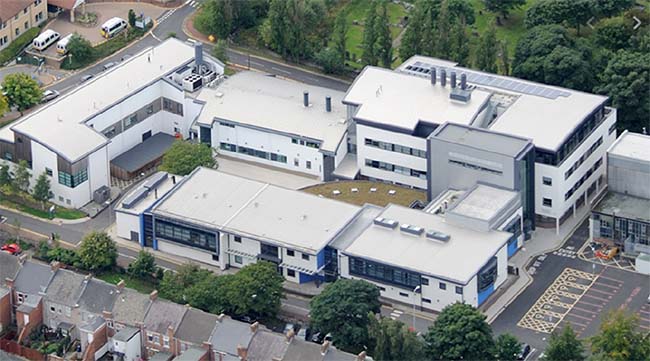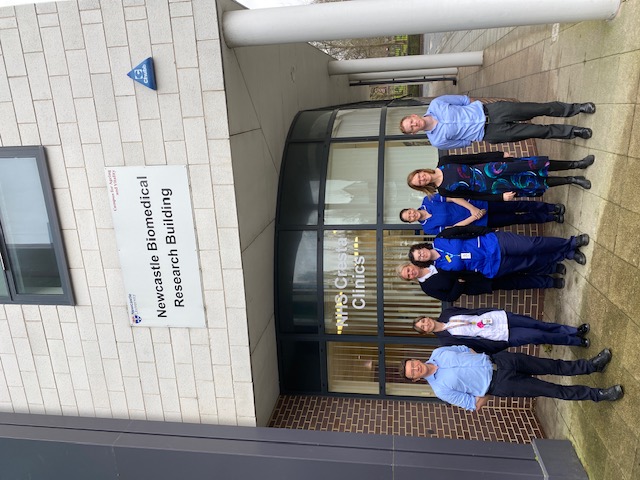 VOLUME 26, ISSUE 1 • March 2022. Full issue »
VOLUME 26, ISSUE 1 • March 2022. Full issue »

My Center: Newcastle upon Tyne
“My Center” is a dedicated article in each Moving Along issue about unique Movement Disorders Centers around the world. Each issue will showcase an exclusive center from a specific region to highlight its dedication to movement disorders with particular strengths in research, community outreach, or patient care.

Share this: Tweet
The Movement Disorders Service at Newcastle upon Tyne Hospitals Trust (NUTH)/ Newcastle University (NU) is an integrated service that serves a population of over 3 million in the Northeast of England and Cumbria, UK. It is one of the leading movement disorders services in the UK and it is part of the UK Parkinson’s (PD) Excellence Network.
The patient centered service is run by a team of five consultant neurologists (two are professors at NU), six specialist nurses (one is a Clinical Academic Professor in Nursing), and two consultant geriatricians specialized in PD. In addition, there is a speech and language therapist and a team of clinical physiotherapists with expertise and experience in managing a wide range of movement disorders.
The Service includes both general and specialist MD clinics. Along with weekly general MD clinics (looking after a population of >1,600 patients with PD, and patients with other movement disorders), we run weekly PD complex treatment clinics for apomorphine, duodopa, and Deep Brain Stimulation.
We run specialist multi-disciplinary team (MDT) clinics every three months for over 150 patients with atypical Parkinsonism. We have dedicated MDT meetings with local old age psychiatrists and neuropsychiatrists to discuss patients with complex needs (e.g PD patients with psychosis, major depression, and dementia, or patients with Tics).
Our weekly Botulinum Toxin Clinics are linked to the Dystonia Service provided by Walkergate Park Hospital, a national neurorehabilitation centre, which manages over 1500 people with dystonia.
Over the last 20 years, the Service has trained over 60 clinicians (both neurologists and geriatricians). The centre has been a host-site for the MDS – Visiting Trainee Program and the European Academy of Neurology Research Fellowship, and attracts national and international students for higher degrees in movement disorders. We organize and lead our regional PD education meetings.
We deliver MDT education sessions for newly diagnosed PD patients and carers (>90% feedback 5/5). In PDUK national audits 96% patients scored our service as excellent/good.
Research is an integral part of the clinical service. The clinics facilitate recruitment for research by academic clinicians and specialist research nurses who perform both a clinical and research role in these settings. The Clinical Ageing and Research Unit (CARU), NU is in the same building as the NHS clinics. CARU is internationally renowned for its research on multiple aspects of PD, including cognition and disorders of gait. With its own team of Clinical Research Nurses, Clinical Trial and Health Care Assistants, and dedicated Study Coordinators and Data Managers, CARU runs a large number of academic–led research studies, Phase II-IV clinical trials in collaboration with Industry partners, and longitudinal observational studies, including the Parkinson’s Progression Markers Initiative (PPMI study) funded by the MJ Fox Foundation. Additionally, its Human Movement Laboratory is dedicated to the investigation of gait, balance and mobility in older people and people with PD. CARU research also benefits from the strong collaborative link with the Newcastle Brain Tissue Resource and the Centre for In Vivo Imaging, NU’s imaging facility for biomedical research and biomarker development. With its state of the art PET MR scanner, the centre is part of the Dementia Platform UK.
More recently, CARU is providing research support to the well-established multidisciplinary, regional tertiary care specialist Huntington's service in the North-East looking after around 600 Huntington's patients and families for more than two decades. The team operates between Cumbria, Northumberland, Tyne and Wear (CNTW) and NUTH Trusts, incorporating NHS England guidance on rare diseases and specialised services principles at heart. The proactive Huntington's population played a key role in developing a successful research portfolio, facilitating several phase III clinical studies so far. Under proactive leadership and support from CARU with established collaborative working, the HD team is expanding their portfolio to facilitate Phase Ia/IIb studies in the North East of England.
Share this: Tweet
Read more Moving Along:







